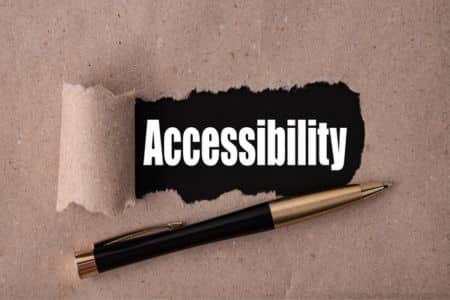Website ADA lawsuits are becoming increasingly common in the digital space, and many business owners are caught off guard. If your website isn’t accessible to users with disabilities, you could face legal consequences, even if you didn’t realize it was non-compliant.
This article will help you understand how the law views unintentional ADA violations, what penalties you might face, and what steps you can take to protect your business. Whether you’re a small business owner, marketer, or developer, understanding your ADA obligations is crucial for minimizing legal risk and fostering a more inclusive digital experience.
ADA Website Compliance Lawsuits Are on the Rise
In recent years, the number of lawsuits related to website accessibility has surged. Thousands of businesses, from small local shops to national brands, have been sued under the Americans with Disabilities Act (ADA) for failing to make their websites accessible to people with visual, auditory, cognitive, and motor impairments. According to accessibility tracking services, over 3,225 digital accessibility lawsuits were filed in federal court in 2022 alone, with many more resolved privately. This growing legal trend shows that regulators and consumers alike expect businesses to treat digital access with the same seriousness as physical access. If your website isn’t inclusive, you could be next on the list, whether you meant to violate the law or not.
What Is Website ADA Non-Compliance?
ADA non-compliance occurs when a website fails to provide equal access to users with disabilities, violating the standards set by the Americans with Disabilities Act. While the ADA was initially written to address physical spaces, courts have increasingly interpreted it to apply to digital environments, especially for businesses that serve the public.
To meet ADA compliance, most organizations follow the Web Content Accessibility Guidelines (WCAG), which outline the structure of websites to ensure that users with screen readers, keyboard navigation, or visual impairments can fully interact with content. Common violations include missing alt text, poor color contrast, inaccessible forms, and content that can’t be navigated with a keyboard.
Even if you’re not intentionally excluding users, failing to meet these standards can result in your site being out of compliance, which may lead to legal consequences.
You Can Get Sued for an Unintentional Non-Compliant Website
Intent doesn’t protect you from liability under the ADA. The law is based on strict liability, meaning a business can be held accountable for non-compliance even if it didn’t know its website was inaccessible. Courts do not require proof that a company intended to discriminate; they only require that a person with a disability was denied equal access to an opportunity.
In practice, this means you can be sued even if your website was built in good faith or if you were unaware of accessibility requirements. For example, a blind user trying to navigate an online checkout process that isn’t screen reader-compatible could file a lawsuit, regardless of your knowledge or intent.
Several high-profile companies and countless small businesses have faced lawsuits over unintentional violations. These cases often result in expensive settlements, mandated site fixes, and ongoing monitoring requirements. The message is clear: compliance is your responsibility, whether you meant to violate the ADA or not.
Key ADA Non-Compliance Website Penalties and Consequences
Failing to meet ADA website accessibility standards can result in significant legal and financial consequences, including unintentional violations. The most common outcome is a civil lawsuit that demands corrective action and monetary settlement. Businesses may also be required to pay the plaintiff’s legal fees, which can quickly add up.
Beyond the courtroom, the costs of non-compliance extend to your brand. Adverse publicity, loss of consumer trust, and reputational damage can hurt your business long after the case is closed. You may also face long-term obligations, such as ongoing accessibility audits or court-mandated monitoring.
For many businesses, the cost of defending even one lawsuit far outweighs the cost of proactively remediating their website. Taking action early can help you avoid fines, preserve goodwill, and stay focused on growing your business.
Who Is Most at Risk of Website Accessibility Lawsuits?

While any business with a public-facing website can be targeted, specific industries face higher legal exposure. E-commerce websites, in particular, are frequent targets due to the transactional nature of their platforms, checkout processes, product descriptions, and interactive features, which must be accessible to all users.
Healthcare providers, law firms, financial institutions, and educational services are also at increased risk, primarily when they serve critical functions that users with disabilities depend on. Even small businesses aren’t exempt; in fact, many lawsuits are filed against local companies that lack dedicated compliance teams or assume they’re too small to attract legal attention.
If your website offers essential services, processes payments, collects user data, or provides critical information, ensuring accessibility should be a top priority to protect your business from unexpected lawsuits.
How to Protect Your Business from an ADA Website Lawsuit
A proactive approach to accessibility is the best defense against ADA-related lawsuits. Start by conducting a comprehensive website accessibility audit to identify barriers that prevent users with disabilities from navigating your site. Utilize a combination of automated tools and manual testing, including screen reader evaluations and keyboard-only navigation checks, to obtain a comprehensive understanding of your site’s compliance.
Next, prioritize remediation based on WCAG 2.1 or 2.2 guidelines, addressing issues such as missing alt text, improper heading structure, insufficient color contrast, and inaccessible forms. Ensure that interactive elements, such as buttons, menus, and pop-ups, are accessible to all visitors, regardless of their ability or disability.
Publishing an accessibility statement shows good faith and signals to users (and courts) that you’re taking inclusion seriously. Finally, build accessibility into your ongoing web development process so compliance becomes a standard, not a one-time fix.
When to Seek Technical Support for ADA Compliance
While online checkers and tools can help identify fundamental accessibility issues, accurate ADA compliance often requires more in-depth technical expertise. If your team lacks in-house accessibility knowledge or if your website utilizes complex features such as interactive forms, dynamic content, or third-party integrations, it’s time to bring in professional support.
Web accessibility specialists and experienced developers can perform manual audits, remediate issues at the code level, and ensure your site aligns with WCAG guidelines. They can also help integrate accessibility best practices into your CMS or development workflow, reducing future risks. Working with a technical partner ensures that your website isn’t just legally compliant; it also delivers a smoother, more inclusive user experience for everyone.
How Oyova Helps Clients Reduce ADA Lawsuit Risk

At Oyova, our ADA compliance services help businesses proactively address ADA website compliance through a combination of technical expertise and strategic planning. Our team conducts in-depth accessibility audits to identify barriers that could expose your business to legal risk. From there, we handle remediation at the code and content level, ensuring alignment with WCAG 2.1 or 2.2 standards.
We also support clients with ongoing accessibility monitoring, CMS integrations, and developer training to embed accessibility into every stage of their digital process. Whether you need a one-time compliance review or ongoing support within an agile workflow, Oyova provides the tools and guidance to protect your brand and enhance the user experience.
Ready to safeguard your website against ADA lawsuits and create a more inclusive digital experience? Contact us today to schedule your accessibility audit.